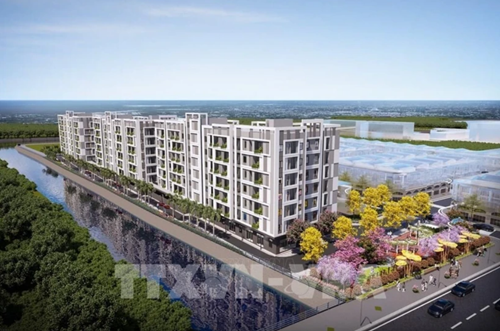According to the PM’s official dispatch No.78/CD-TTg dated May 29, over the past time, the Government and the PM have issued various resolutions and documents with drastic, timely and effective directions on administrative reforms. The Ministry of Construction has also coordinated with other ministries, agencies, and localities to step up the review, reduction and simplification of administrative procedures in the sector, achieving notable results.
However, according to feedback from people and businesses, some construction projects remain prolonged due to cumbersome administrative procedures and high compliance costs.
    |
 |
|
A graphic design of a social housing project |
Given this, the PM requested the Minister of Construction and local authorities to continue implementing the tasks and solutions assigned in the Government’s Resolution No.66/NQ-CP dated March 26 and the PM’s Official Dispatch No.69/CD-TTg dated May 22, and other specific tasks.
The ministry was asked to promptly review, streamline, and simplify 361 administrative procedures related to production and business activities, along with 447 business conditions under its jurisdiction, while ensuring a 30% reduction in administrative processing time, compliance costs, and business conditions by 2025.
It needs to review and add necessary technical standards and regulations in the construction sector, especially those on construction planning, and abolish and amend technical standards and regulations no longer suitable, the leader said.
Administrative procedures on capacity of enterprises should be adjusted in the direction that firms will self-declare their eligibility for operations, which will be assessed by competent state agencies.
Competent authorities were asked to continue advancing decentralization in handling administrative procedures related to project appraisal and licensing in line with the restructuring of administrative units and the implementation of the two-tier local government model.
The PM also urged stronger efforts in digitalization, automation, and reuse of data of planning, land, construction activities, residents, and businesses to save time and costs.
Meanwhile, local authorities were requested to ensure uninterrupted operations during the administrative restructuring and implementation of the two-tier local government model. Provincial and municipal People’s Committees must proactively monitor the legal compliance of entities involved in construction and investment activities.
The Government’s Office will supervise the implementation of the official dispatch and report issues beyond its authority to the PM.
Source: VNA